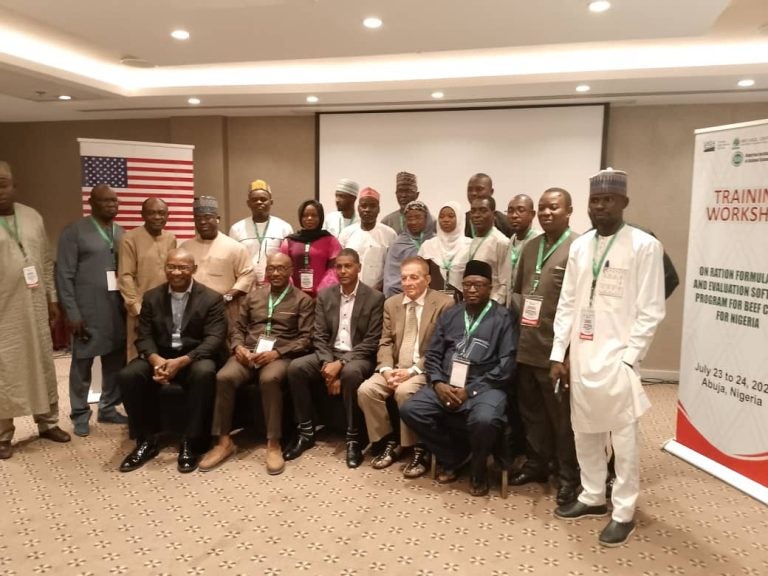The need to reduce global warming; majorly caused by enteric methane gas emissions, improve livestock productivity among small-holder farmers and formulation of least cost rations that meet basic requirements of animals, among others, have been emphasized.

These were disclosed in a series of training workshops conducted recently in Abuja on ration formulation and evaluation programs for beef cattle in Nigeria by University of California, Davis (UCD), United States Department of Agriculture, Foreign Agricultural Service (USDA FAS) and United States Embassy in collaboration with Michael Okpara University of Agriculture, Umudike (MOUAU) and Nigerian Institute of Animal Science (NIAS).

In his opening remarks, Dr. Andre Ntamach, Director USDA Foreign Agricultural Services, recognized that Nigeria is a major player in the continent of Africa and has what it takes to revolutionize agriculture and become be self sufficient in food production. The Ration Software technology, he emphasised , aims at ensuring least cost ration for beef cattle without compromising basic nutritional requirements and methane reduction.




He further reiterated that the software can be updated to accommodate other livestock species as dairy cattle, sheep and goats as well as swine and poultry.
This project, funded by USDA FAS, has its main objective which is the use of this FARP software to improve Feed Ration Formulation to Meet Climate Smart Livestock Production Needs in Nigeria which is in line with sustainable development goals.
Herder-farmer conflicts has been a recurrent problem which arise from trekking cattle long distances in search of fodder. Deployment of this technology would engender rearing of cattle in colonies and ranches and curb the incessant and perennial herder-farmer conflicts in Nigeria which has tremendous negative impact on crop and animal production.
In his speech, the team lead, Dr. Ermias Kebreab, who expressed delight in the quality of delivery and participation of the training workshop, called for the extension of this innovation down the line to rural livestock farmers.
Adoption of this innovation in the agricultural sector, he said would ensure food security amidst looming global food crisis.
Meanwhile, the workshop technical session which was anchored by Dr. Abbas Ahmadi, demonstrated ration formulation and evaluation programs for PC and mobile phones for participants in English and Hausa languages.
In his closing remark, the workshop training coordinator for Nigeria, Professor Francis Okechukwu Ahamefule of Michael Okpara University of Agriculture, Umudike, commended Dr. Ermias, Dr. Abbas and Dr. Andre for electing to come to Nigeria to share in this breakthrough, and promised that they would make utmost use of the gains of the workshop.
He also thanked the participants for their impressive response and tasked them to ensure that the knowledge acquired in this training workshop is shared and transferred to their colleagues, farmers, lecturers and students in their various areas of operation.
Prof. Ahamefule further expressed hope that this technology would protect the environment, improve livestock productivity, enhance food security and sustainable livelihood among Nigerians and arrest herder-farmer conflicts in the country through modernized ranching.
Participants to the workshop were drawn from Ministry of Agriculture, industries, academia and farmers across the length and breadth of Nigeria.
Mr. Iheanyi Orji of USDA was also present at the workshop.

























